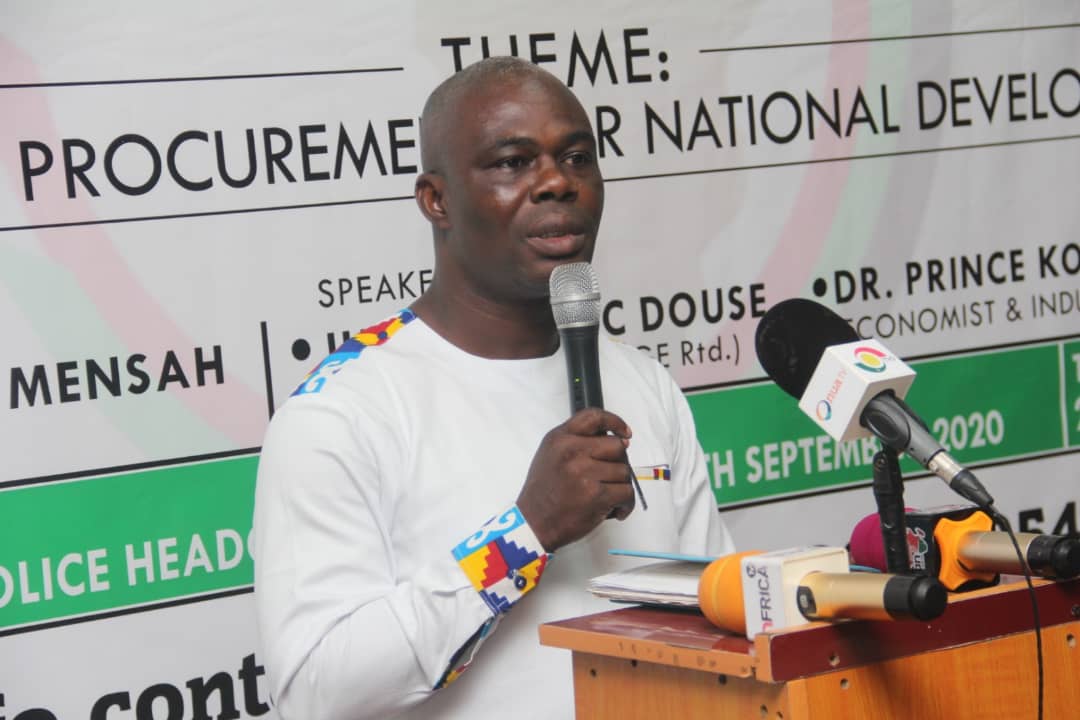
The drive to a clean, empowered society and digitised economy does not only depend on technology but also on public policy, political will and less corrupt citizens, Moses Kwesi Baiden, Chairman, Executive Director and Chief Executive Officer (CEO) of Margins ID Group, has indicated.
Digital integration of the country’s systems will cut down on corruption and its effects on the economy by reducing identity fraud and human-to-human interactions in transactions, he said, citing the Ghana Card as an example of how digitisation can address most of the ills in society.
Mr. Baiden made these remarks at an exclusive dialogue session in Accra where he presented Margins ID Group’s over-3 decade journey in the identity solutions business, and the group’s role in Ghana’s national ID system.
Margins ID Group is a Ghanaian-owned company and technical partner in the Ghana Card project via its subsidiaries: Identity Management Systems; Identity Management Systems II; Intelligent Card Production Systems; and Margins ID Systems Applications Ltd.
The group, in a Public-Private Partnership (PPP) with the National Identification Authority (NIA), has provided smart and a secured multipurpose national ID cards (Ghana Cards) to over 85 percent of the country’s adult population.
As of August 18, 2023, the total number of Ghana Cards printed stood at 17,326, 859 out of 17,460,214 registered Ghanaians.
Prior to provision and issuance of the current Ghana Card, the country had over the years grappled with multiple unverifiable identity registers, fraudulent names and bio-data information issues – the effects of which contributed to inefficiencies such as inaccurate data structures; high level of human interference; manipulation and fraud; and ineffective distribution of public resources.
The new national ID system therefore seeks to create a single source of ‘truth’ – based on one legal identity, biometrics and biostatistics. This, according to experts, is the foundation for securely verifying people remotely or physically in real-time.
Institutions’ biometric verifications with Ghana Card/mandatory uses of the card
The National Identity Register Regulations, 2012 (L.I. 2111), mandate use of the national identity card commonly known as the ‘Ghana Card’ for all transactions where identification is required. Regulation 7 mandates that the card issued to an individual be used in exercises such as the issuance of passports, driver’s licences and insurance policies.
Others include banking transactions, land registration, purchase or transfer, transactions pertaining to NHIS, pensions, SSNIT and consumer credit transactions; and payment of taxes and SIM cards registration.
Other exercises include application for public and government services, transactions requiring gazetted publication, registration of voters, and any other transaction which the NIA may determine and publish in the Gazette.
This approach seeks to curb duplication in data systems, enhance e-government and e-commerce services, improve social and financial inclusion, sanitise voter registrations, and improve tax collection. The initiative will also strengthen payment systems and harmonise all data across all government and private institutions.
As of August 22, 2023, there were 44.6 million biometric verifications with the Ghana Card by institutions. These organisations include banks and financial institutions, the Passport Office, Social Security and National Insurance Trust (SSNIT), Controller and Accountant General’s Department and National Health Insurance Authority (NHIA).
Others are Ghana Revenue Authority (GRA), Driver and Vehicle Licencing Authority (DVLA) among others.
Notwithstanding ID’s benefits to the nation and people, there still remains a gap in public education and understanding that often fuels speculation about its relevance.
Mr. Baiden, who described such speculations as unfortunate, urged the public to prioritise their need to own the card or, essentially, be left out.
“Some people cannot be bothered for whatever reason because they do not see the essence,” he bemoaned.
Enforcement toward a clean, empowered society with the Ghana Card
While some institutions have set the pace with verifications via the Ghana Card, others are yet to be enrolled.
To rid the government payroll system of ‘ghost names’ for instance, the Controller and Accountant-General’s Department is set to verify all government workers before salaries are paid.
As a result, the Department has directed that the NIA register and issue Ghana Cards to all public sector workers who do not have them.
“From August 28 to September 8, 2023, all public sector employees on government of Ghana payroll who have not yet acquired the Ghana Card are required by the Controller and Accountant-General’s Department to do so. We are facilitating that by giving them this window of opportunity.
“So, after September 8, if a public sector person on government payroll does not present a Ghana Card, the Controller and Accountant-General will assume that person does not exist. It is to get rid of ghost names from the payroll,” noted Professor Kenneth Agyeman Attafuah, Executive Secretary-NIA.
In a bid to check crimes and certain inefficiencies at the country’s borders, the Ghana Immigration Service will in a few months to come be integrated with the system to enable seamless verification of identities along the borders.
Also, all NHIS claims will be verified with the Ghana Card. This will ensure payment of claims for only verified claims, and is projected to save the country millions of cedis.
Similarly, to prevent crimes and inefficiencies in the land administration system, the Lands Commission is readying to be enrolled to verify with the Ghana card in the purchase, registration, and transfer of land.
The post Digitisation drive hinges on public policy, political will – Margins ID CEO appeared first on The Business & Financial Times.
Read Full Story


















Facebook
Twitter
Pinterest
Instagram
Google+
YouTube
LinkedIn
RSS